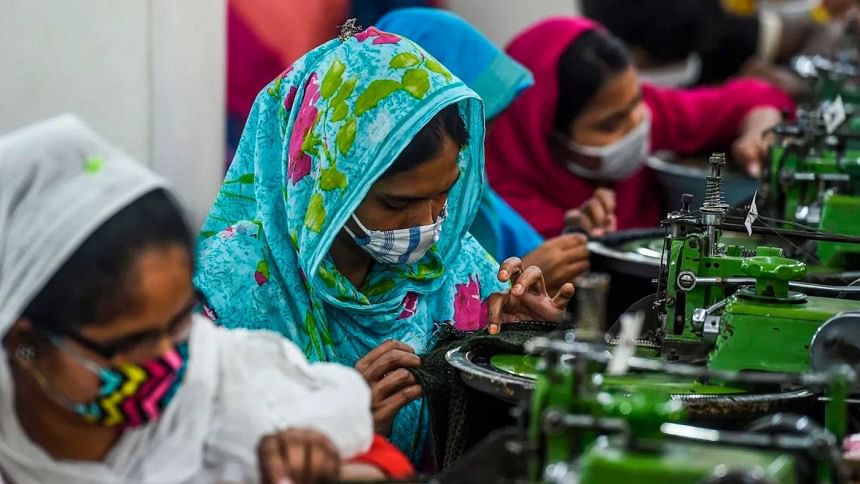Creative policies needed to support RMG makers

While Covid-19 has sent shock waves through the ready-made garment (RMG) supply chains that continue to reverberate, there is also a broader issue that needs more attention: sustainability. For apparel makers, the biggest impact this has is in terms of the regulatory environment.
It may not have been widely reported in our country, but just last week, the European Union (EU) launched a new strategy for textiles that could potentially have a big impact on global fashion supply chains such as Bangladesh. And one area the strategy is focused on is sustainable fashion and stopping greenwashing.
I think our industry needs leadership, support and guidance from the government and policymakers now more than ever. We need a clear and robust strategy as well as practical support measures to help us navigate our way through these uncertain and challenging, but also opportunistic times. Have no doubt about it: these are the times of huge opportunities. In any economic shake-up, there will be winners and losers, and we have to make sure we are the former, not the latter. Our government can help with that, but it must be smart and creative with the policy packages it uses to reinvigorate our sector.
What would I like to see in terms of our government support for RMG manufacturers? Firstly, I believe we need more investment in our sector to take it to the next level. We can produce apparel products in large volumes, and if a major fashion player wants tens of thousands of units at a short notice, we are as good as any supplier in the world. But what about the ability to provide a seamless, one-stop shop? Vertical integration is the next step for Bangladesh's RMG sector and, while we have begun to make progress in this area, there is still more we can do.
To facilitate this process and the general upgrading of its textile industry, Vietnam's government has provided significant financial incentives for foreign direct investments (FDIs). FDIs can bring in the expertise we lack in Bangladesh to help drive operational efficiency as well as move to the value-added apparel products.
Secondly, I would like to see greater financial incentives for local factories to invest in new technologies and sustainable innovation. There are huge financial benefits to sustainable investment, as I have discussed previously. Factory owners need to be incentivised; they need to be directed along the right path, and this can be done via a range of fiscal measures, including quick access to investment credits and soft loans.
How about allowing garment makers to gain 100 percent first-year capital allowances to cover their expenditure on energy-efficient plants and machinery, for example? Or granting tax relief to companies investing in new energy-efficient machinery or water-saving equipment? Or how about supporting interest-free loans for garment makers to install energy-efficient equipment and make other sustainability-related investments?
Energy efficiency and other sustainability-related projects typically pay for themselves within a few years, through the cost savings achieved. This makes them attractive for investments with serious returns. However, they require an initial upfront capital investment, and this is where we need government support via our financial institutions.
Remember, many of our customers are now increasingly looking to only work with factories that meet certain green criteria. Their rules are stipulated in their supplier terms and conditions which, from an environmental perspective, are becoming more onerous by the year.
Finally, I believe our government can provide more generalised financial support for the apparel manufacturers in terms of pushing the brand Bangladesh to a global level.
For instance, how can we increase our share in our main export markets, such as the EU, the US and the UK, and how can we reach beyond them? Many countries provide support to their key strategic exporters via export trade missions. Often, these missions—which governments subsidise to some degree—allow seasoned exporters to share ideas and information with up-and-coming exporters. These provide an excellent learning process for all and offer exporters an opportunity to make new contacts and win new business in international markets.
I believe in free markets and healthy competition; all garment manufacturers must ultimately stand on their own feet in what are ferociously competitive international markets. At the same time, there is no harm whatsoever in our government providing leadership and strategy backed by targeted support packages for our industry. Remember, ours is a sector of huge strategic importance. Government investment in it now, at this crucial juncture, will pay for itself multiple times over in terms of tax revenue and other softer benefits in the future. Support for garment makers will not go to waste and will be considered as money well spent.
Mostafiz Uddin is the managing director of Denim Expert Limited. He is also the founder and CEO of Bangladesh Denim Expo and Bangladesh Apparel Exchange (BAE).

 For all latest news, follow The Daily Star's Google News channel.
For all latest news, follow The Daily Star's Google News channel. 



Comments